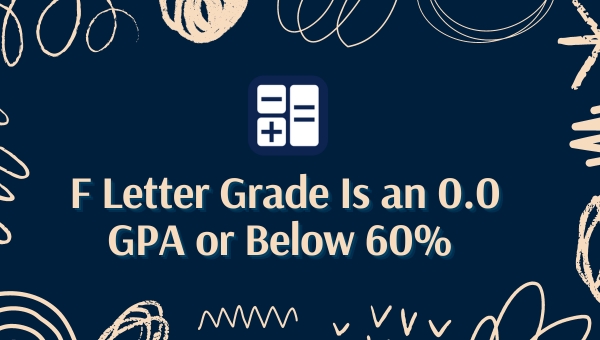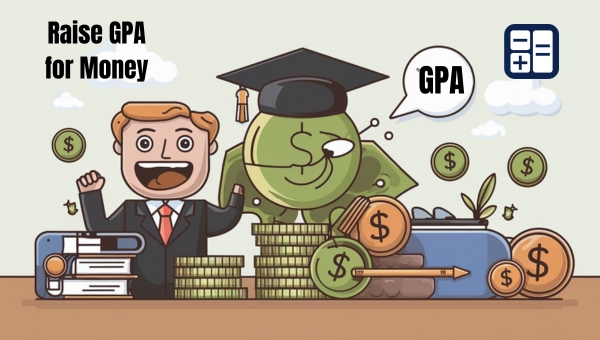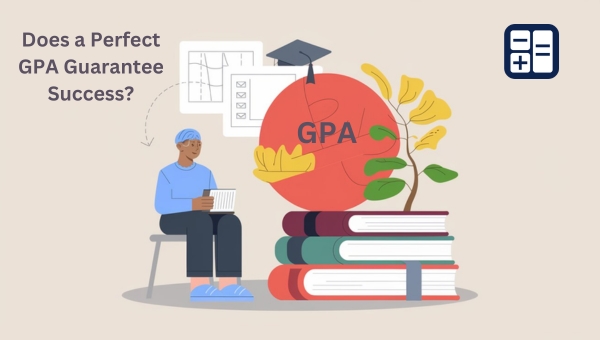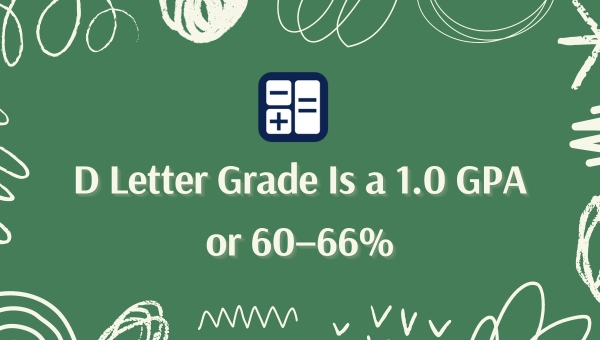F Letter Grade Is an 0.0 GPA or Below 60%

You might wonder why an F letter grade translates to a 0.0 GPA or below 60%. This failing grade indicates more than just poor performance; it can significantly impact your academic journey and future prospects. Understanding the implications of an F GPA is crucial, especially for high school students aiming for college admissions.
But don’t worry, there are proven tips to avoid this and strategies to raise your GPA swiftly. Curious about how to turn things around and ensure academic success? Let’s explore the steps you can take to improve your performance and secure a brighter future.
What is an F GPA?
An F GPA represents a failing grade point average and indicates that a student hasn’t met the minimum academic requirements in their coursework.
When you receive an F, it typically means your performance in the course was below 60%, reflecting a lack of understanding or engagement with the material. An F translates directly to a 0.0 on the GPA scale, severely impacting your overall academic standing.
Understanding what an F GPA entails can help you grasp the gravity of such a grade. Schools use GPA as a standard measure to compare academic performance.
A 0.0 GPA signifies that you didn’t earn any quality points for the course, dragging down your cumulative GPA. This can affect not just your current standing but also your future opportunities, such as eligibility for sports, clubs, or even graduation.
If you’re facing an F GPA, it’s crucial to identify the root causes. Is it a lack of study time, difficulty understanding the material, or perhaps personal issues? Addressing these problems is essential.
Consider speaking with your teachers, seeking tutoring, or managing your time better. Improving your study habits and seeking help can gradually raise your GPA, helping you get back on track.
What does an F GPA mean for high school students?
An F GPA can significantly impact your college options, affecting your chances at safety, target, and dream schools. Admissions committees often view poor grades as a red flag, making it harder to stand out. It’s crucial to understand how this GPA influences your applications and what steps you can take to improve your prospects.
Safety Schools
Receiving an F GPA in high school can significantly impact your future academic opportunities, making the concept of safety schools crucial.
Safety schools are colleges and universities where your academic credentials (GPA, test scores) exceed the school’s average admission requirements. They offer a greater likelihood of acceptance, providing a backup plan if your top choices don’t work out.
You might think that an F GPA limits your options drastically, but safety schools can still be within reach. These institutions often have more flexible admission criteria and are more willing to consider the whole student, not just grades.
Here’s how safety schools can be a lifeline:
- Community Colleges: They often have open admissions policies, meaning they accept all applicants, giving you a fresh start.
- State Universities: Some state schools have lower GPA requirements and offer extensive support services to help you succeed.
- Trade Schools: Focused on specific skills and careers, these schools often prioritize your interest and commitment over your GPA.
Target Schools
For high school students, an F GPA can often feel like a significant setback, but it doesn’t necessarily close the door on target schools. You might think that an F on your transcript means your chances of getting into a good college are gone, but that’s not always the case.
Many target schools look at more than just your GPA. They’re interested in your overall story, improvements, and how you bounce back from challenges.
Here’s what you can focus on to make yourself a more appealing candidate:
- Strong Personal Statement: Use your essay to explain your academic journey, the obstacles you’ve faced, and how you’ve grown from them. This can provide context to your grades and highlight your resilience.
- Extracurricular Activities: Schools appreciate well-rounded students. Engage in clubs, sports, or volunteer work to show that you’re a committed and dynamic individual beyond your GPA.
- Improvement Over Time: Admissions officers love to see upward trends. If you can demonstrate significant improvement in your grades over time, it shows determination and the ability to overcome difficulties.
Don’t let a single grade define your entire high school experience. Focus on these areas to make a compelling case for yourself, and you might still hit your target.
Dream Schools
Dream schools are often perceived as out of reach for students with an F GPA. It can feel disheartening, but it’s important to remember that an F isn’t the end of your academic journey.
Here’s what an F GPA means for you and how you can still aim for those dream schools.
First, understand that an F GPA signals academic difficulties, but it doesn’t define your potential. You can take actionable steps to turn your situation around:
- Seek Academic Support: Utilize tutoring services, meet with your teachers, and ask for help when you need it. Showing that you’re committed to improving can make a significant difference.
- Retake Classes: If possible, retake the courses where you received an F. Many schools allow students to replace failing grades on their transcripts, which can boost your GPA.
- Extracurricular Activities: Engage in clubs, sports, or volunteer work. These activities can showcase your strengths and dedication, making your college application more compelling.
Dream schools look at the whole picture. While academic performance is crucial, determination, resilience, and personal growth are equally important.
Proven Tips to Get a F GPA
If you’re aiming for an F GPA, start by skipping all assignments and ignoring study guides. Missing every class and avoiding group projects will further ensure your grades plummet.
Skip All Assignments
One surefire way to tank your GPA is to consistently skip all your assignments. When you don’t turn in homework, projects, or any form of coursework, you’re essentially ensuring you receive zero points for those tasks.
Professors often assign a significant portion of your grade to these assignments, so missing them will quickly drag your GPA down to an F level.
By not submitting assignments, you also miss out on valuable feedback that could help improve your understanding of the subject. This lack of engagement means you won’t develop the necessary skills or knowledge to perform well on exams or other assessments.
Skipping assignments can also lead to a negative reputation with your professors. They may view you as uncommitted or irresponsible, which could affect your participation grade and any future opportunities for extra credit or leniency.
Additionally, when you skip assignments, you lose out on the chance to practice and reinforce what you’ve learned in class. This will make it even harder to keep up with the course material, leading to poor performance on tests and a further decline in your overall grade.
Ignore Study Guides
Ignoring study guides is another effective strategy for ensuring your GPA plummets to an F. If your goal is to fail, then disregarding these valuable resources is essential.
Study guides are designed to focus your attention on key materials that will likely appear on tests and exams. By ignoring them, you can guarantee that you’ll miss out on crucial information.
When your teacher hands out a study guide, don’t even glance at it. Toss it in your backpack or, better yet, the trash. This will ensure you’re completely unprepared for any upcoming assessments. Instead of using the guide to structure your study sessions, spend that time doing anything else—binge-watching shows, playing video games, or scrolling through social media.
Study guides often condense complex subjects into digestible formats, making it easier to understand and remember the material. Ignoring them means you’re choosing to navigate your coursework blindly.
This lack of preparation will reflect in your test scores, contributing significantly to that coveted 0.0 GPA.
Miss Every Class
Missing every class is a surefire way to tank your GPA to an F. If you want to guarantee that 0.0 GPA, skipping every single lecture is your best bet.
Don’t set an alarm, don’t check your schedule, and definitely don’t show up. By missing classes, you’ll miss out on crucial information, assignments, and exam dates, ensuring you have no idea what’s going on.
When you’re not attending classes, there’s no way to participate in discussions or ask questions about confusing topics. You won’t hear about any changes in the syllabus, and you’ll have no chance to understand the professor’s expectations.
Plus, many professors include participation and attendance as part of your grade. By not showing up, you’re automatically forfeiting those easy points.
Moreover, missing class means you won’t form relationships with your classmates or instructors, who could provide support and resources. Without these connections, studying on your own becomes nearly impossible.
The more classes you miss, the further you fall behind, creating a snowball effect that makes catching up an insurmountable task. So, if an F GPA is your goal, keep hitting that snooze button and stay home.
Avoid Group Projects
Skipping every class is just the beginning; if you really want to cement that F GPA, steering clear of group projects is another effective strategy. Group projects often account for a significant portion of your grade, and participating in them means contributing to that overall score. By avoiding these projects, you ensure you don’t accidentally boost your GPA.
When you’re assigned to a group project, don’t attend the initial meetings. Let your group members do all the planning and the work. If they try to contact you, ignore their messages and emails.
This way, you won’t contribute anything meaningful or help them in any way. Your absence will frustrate your peers and likely result in poor evaluations from them, which will drag down your grade even further.
Additionally, if your project requires a presentation, make sure you’re nowhere to be found on the due date. Your group will either scramble to cover your part or fail to present effectively, impacting the overall project score.
Procrastinate on Exams
Procrastinating on exams is a surefire way to secure that F GPA you’re aiming for. To start, make sure you put off studying until the very last minute. The less time you give yourself to prepare, the lower your chances of retaining any useful information.
Also, don’t bother organizing your study materials; just wing it. Chaos is your best friend when trying to fail.
Next, ignore any practice exams or review sessions. These are designed to help you understand the material, which is exactly what you don’t want.
If your instructor offers extra help, politely decline or, better yet, skip class entirely. This ensures you won’t accidentally absorb any knowledge.
On the night before the exam, stay up late doing anything but studying. Binge-watch a TV series, play video games, or scroll through social media.
The goal is to be as tired and unfocused as possible when you finally sit down to take the test.
How to Raise Your GPA Fast?
Raising your GPA quickly requires a strategic approach and consistent effort. First, identify the courses where you’re struggling most and seek immediate help. Utilize office hours, tutoring centers, and study groups. Don’t hesitate to ask your professors for guidance; they can provide insights on how to improve.
Next, focus on time management. Create a detailed study schedule that allocates specific times for each subject. Prioritize your tasks by deadlines and importance, and stick to your plan. Avoid distractions during study sessions by finding a quiet, dedicated space.
Improve your study techniques. Instead of passive reading, use active methods like summarizing information, creating flashcards, and teaching the material to someone else. Practice problems repeatedly, especially in subjects like math and science.
Additionally, take care of yourself. Ensure you’re getting enough sleep, eating well, and exercising regularly. A healthy body supports a sharp mind.
Consider retaking courses where you received low grades if your institution allows it. This can directly boost your GPA.
Lastly, stay motivated. Set small, achievable goals and reward yourself when you reach them. Monitor your progress and adjust your strategies as needed. With dedication, you’ll see your GPA rise.
Conclusion
An F GPA, translating to 0.0 or below 60%, can severely impact your academic and extracurricular opportunities. However, don’t lose hope—take proactive steps to improve your grades and understanding of the material.
Seek help from teachers, attend tutoring sessions, and stay organized with your studies. By putting in the effort, you can raise your GPA and open up more opportunities for your future educational and career goals.




